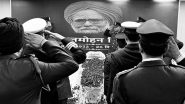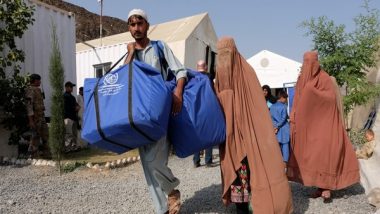New Delhi [India], June 23 (ANI): Even though India is not a signatory to the Refugee Convention and the Protocol, and also does not have a national refugee protection framework, it hosts over 250,000 refugees and asylum-seekers including 40,000 Rohingyas, a Muslim minority from Myanmar after ethnic violence in Myanmar led to their mass exodus a few years ago.
India has a rich historical background of welcoming refugees and asylum-seekers who were displaced due to a variety of reasons and keeping with tradition, India continues to provide protection and shelter to vulnerable individuals from foreign countries even today including Tibetan minorities from China, Hindus and Sikhs from Pakistan and Muslims from Myanmar.
At present, India hosts over 250,000 refugees and asylum-seekers, and it spent USD 13 million to ensure the basic needs of vulnerable individuals in 2022. There has been an increase in asylum-seekers that has led the United Nations to call India a "generous" host.
Proving ill-intentioned propaganda wrong, the government of India has ensured health, sanitation, medical and educational facilities for Rohingya refugees. It also has built permanent houses for them. India has over 100,000 refugees from neighbouring Sri Lanka, who have been given shelter in different camps. A mass exodus occurred due to the ethnic violence in the island country. Thousands of Sri Lankans are fleeing to India nowadays to escape the heat of the economic crisis.
Also Read | Rajasthan Shocker: Woman's Body Found Floating Inside Pond in Dholpur.
India's mission to allow refugees did not stop during the Covid-19 pandemic as well. The number of individual refugees increased by 9 per cent in 2021. India has recorded a steady flow of refugees from its neighbours - Pakistan, China, Sri Lanka, Afghanistan, and Myanmar, where religious and ethnic minority communities or women or civil rights activists are targeted.
India had opened its border for over 10 million Bangladeshi people to evade brutality by Pakistani military forces in the early 1970s. India was not a signatory to any international convention, yet the New Delhi government helped these refugees settle in the country and provided financial assistance.
Tibetan minorities, who faced brutal China's oppression, made their way to India at intervals. They have been coming to India since the late 1950s as refugees. There are many townships across India, which have been set to give shelter and protection to the persecuted Tibetan people.
Dalai Lama resides in India's Dharamshala town, which acts as the capital of the Tibetan government in exile. Even Tibetans who practice Islam have been given a place to live in India- administered Kashmir, which is a Muslim-majority region.
One such Tibetan Muslim refugee Ahmad Zareif said the community has been living peacefully in India.
"No one was even touched. In over 50 years, we have never faced any harassment," he said.
Kashmiris are fond of the food the refugee, Tibetan Muslims from China cook, and intercommunity marriages are taking place.
These refugees are not optimistic about being able to return to Tibet, as they fear brutal repercussions.
Abdullah Jami, a 73-year-old Tibetan Muslim refugee, said he cannot contact or trace his relatives, who had come to meet him from Tibet in the mid-80s.
"Even though I know I have my brother's family and relatives there, [it's as though] they simply don't exist," he said.
They are getting adopted into the local Indian culture and even have been given Indian citizenship.
Pakistan and Afghanistan have been witnessing the persecution of non-Islamic communities by the extremists, which forced minority communities to flee these countries and seek asylum elsewhere. India has been the top destination. After coming to power in 2014, the Modi government came up with schemes to provide shelter to them, which received a huge response. In 2015, 4,300 Hindu and Sikh refugees from Pakistan and Afghanistan were not just given asylum but offered Indian nationality as well.
Erstwhile Pakistani citizen Sunil Maheshwari fled Pakistan due to religious persecution. He was granted Indian citizenship.
"Since we got Indian citizenship, we are no longer outsiders and nobody can call us 'Pakistani'. We are very much Indian and proud of it," he said.
With the aim of providing citizenship to 200,000 refugees from neighbouring countries, the government of India has come up with necessary laws. There has been a constant flow of refugees. The government processed 16,121 citizenship applications in just 15 months in 2019-20. Dharamveer Solanki, who got Indian citizenship and could build a house after fleeing Pakistan, said "It felt as though I had been reborn." (ANI)
(This is an unedited and auto-generated story from Syndicated News feed, LatestLY Staff may not have modified or edited the content body)













 Quickly
Quickly

















